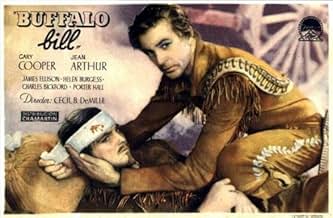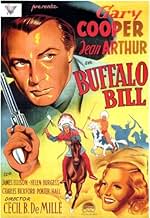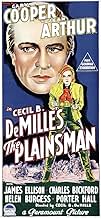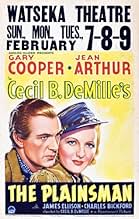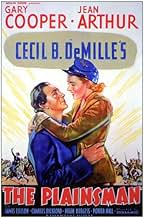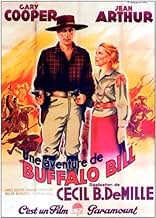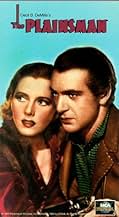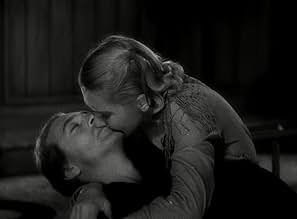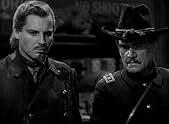AVALIAÇÃO DA IMDb
6,8/10
2,6 mil
SUA AVALIAÇÃO
Adicionar um enredo no seu idiomaWild Bill Hickok and Buffalo Bill Cody attempt to stop an Indian uprising that was started by white gun-runners.Wild Bill Hickok and Buffalo Bill Cody attempt to stop an Indian uprising that was started by white gun-runners.Wild Bill Hickok and Buffalo Bill Cody attempt to stop an Indian uprising that was started by white gun-runners.
- Direção
- Roteiristas
- Artistas
- Prêmios
- 3 vitórias no total
Fred Kohler
- Jake - A Teamster
- (as Fred Kohler Sr.)
Pat Moriarity
- Sgt. McGinnis
- (as Pat Moriarty)
Avaliações em destaque
With the end of the North American Civil War, the manufacturers of repeating rifles find a profitable means of making money selling the weapons to the North American Indians, using the front man John Lattimer (Charles Bickford) to sell the rifles to the Cheyenne. While traveling in a stagecoach with Calamity Jane (Jean Arthur) and William "Buffalo Bill" Cody (James Ellison) and his young wife Louisa Cody (Helen Burgess) that want to settle down in Hays City managing a hotel, Wild Bill Hickok (Gary Cooper) finds the guide Breezy (George Hayes) wounded by arrows and telling that the Indians are attacking a fort using repeating rifles. Hickok meets Gen. George A. Custer (John Miljan) that assigns Buffalo Bill to guide a troop with ammunition to help the fort. Meanwhile the Cheyenne kidnap Calamity Jane, forcing Hickok to expose himself to rescue her.
The dated "The Plainsman" is a great deception, with a pretentious and shallow story without historical accuracy, "politically incorrect" in the present days and a terrible screenplay that wastes Gary Cooper and Jean Arthur. Their performances are below average with awful characters. The best part is the beginning, with the inception of the lobby of the greedy manufacturers of weapons using the repeating rifles to provide Indian (and also "white man") annihilation in the name of the pockets full of money. My vote is five.
Title (Brazil): "Jornadas Heróicas" ("Heroic Journeys")
The dated "The Plainsman" is a great deception, with a pretentious and shallow story without historical accuracy, "politically incorrect" in the present days and a terrible screenplay that wastes Gary Cooper and Jean Arthur. Their performances are below average with awful characters. The best part is the beginning, with the inception of the lobby of the greedy manufacturers of weapons using the repeating rifles to provide Indian (and also "white man") annihilation in the name of the pockets full of money. My vote is five.
Title (Brazil): "Jornadas Heróicas" ("Heroic Journeys")
This movie has Wild Bill Hickok, Calamity Jane, Buffalo Bill and General Custer all together. Gary Cooper plays Wild Bill and Jean Arthur plays Calamity Jane and Charles Bickford plays the bad guy who sells weapons to the Indians and you can hardly recognize him. This was the first time Cecil B. DeMille and Gary Cooper worked together and the next movie the made was basically the same but set in a different time. This movie starts out with Lincoln's assassination and it also deals with an Indian war. Calamity Jane is in love with Wild Bill and Buffalo Bill has gotten married and now wants to stay home. This movie also deals with Custer's last stand and is far from accurate. Gary Cooper is good as usual and i usually don't like Jean Arthur but i liked her here.
Wild Bill Hickock, Buffalo Bill Cody, and Calamity Jane fight alongside General Custer and expose a scheme by greedy arms manufacturers to sell repeating rifles to renegade Indians.
This somewhat gratuitous exercise in wild west name-dropping is pretty silly but also fairly entertaining as well, though it's a bit too long and runs out of steam near the end.
Also, it might be off-putting to many modern viewers due to it's politically incorrect, stereotyped treatment of Indians.
The feisty Jean Arthur is extremely cute as Calamity Jane and easily runs away with the picture.
Recognizable cameos include iconic western sidekick George "Gabby" Hayes as a wounded scout and director Cecile B. DeMille's future son-in-law Anthony Quinn as the Cheyenne brave who relates the news of Custer's last stand to Cody and Hickock.
This somewhat gratuitous exercise in wild west name-dropping is pretty silly but also fairly entertaining as well, though it's a bit too long and runs out of steam near the end.
Also, it might be off-putting to many modern viewers due to it's politically incorrect, stereotyped treatment of Indians.
The feisty Jean Arthur is extremely cute as Calamity Jane and easily runs away with the picture.
Recognizable cameos include iconic western sidekick George "Gabby" Hayes as a wounded scout and director Cecile B. DeMille's future son-in-law Anthony Quinn as the Cheyenne brave who relates the news of Custer's last stand to Cody and Hickock.
Conceived and executed with all the brio typical of a De Mille epic - all the 64 pistols used in the film came from his personal collection - 'The Plainsman', for all its attention to petty historical detail (De Mille was insistent that the Phrase 'Go West, Young man' be correctly attributed to John B. Searle, the Editor of The Terra Haute Express) plays fast and loose with history.
Cooper is the austere Hickok, Ellison (a regular in the Hopalong Cassidy series, loaned to De Mille by 'Pops' Sherman)a boyish Buffalo Bill, Arthur a breezy Calamity Jane and Miljan a heroic Custer to whose defence all three come. Bickford is the smooth gun running villain. De Mille's well-practised abilities in handling big budgets, big casts and big stories overcame the doggedly domestic drama of Cooper and Arthur's relationship. Slow moving and overly romantic by modern standards in its depiction of Westward expansion, 'The Plainsman' remains an entertaining spectacle.
In 1966, Universal remade the movie as a vastly inferior telefilm.
Phil Hardy
Cooper is the austere Hickok, Ellison (a regular in the Hopalong Cassidy series, loaned to De Mille by 'Pops' Sherman)a boyish Buffalo Bill, Arthur a breezy Calamity Jane and Miljan a heroic Custer to whose defence all three come. Bickford is the smooth gun running villain. De Mille's well-practised abilities in handling big budgets, big casts and big stories overcame the doggedly domestic drama of Cooper and Arthur's relationship. Slow moving and overly romantic by modern standards in its depiction of Westward expansion, 'The Plainsman' remains an entertaining spectacle.
In 1966, Universal remade the movie as a vastly inferior telefilm.
Phil Hardy
This Cecil B. DeMille movie has all the trademarks of that director. It's a big and spectacular look at the Old West. Perhaps there's a bit too much emphasis on creating an epic and not enough on telling a good story.
To be clear, I don't mind that it takes so many liberties with historical facts. When I watch a movie I don't necessarily need a history lesson, and I can forgive a movie taking liberties in order to tell a good story.
However, there is little subtlety and emotional weight in the storytelling. In the first half, things happen to move the story along, without necessarily making much sense.
Gary Cooper, not my favorite among the western genre's big stars, is aloof as Wild Bill Hickok. No one can deny his cinematic presence, though. Jean Arthur brings some fun to her role as Calamity Jane. I have seen some reviewers praising her performance, but the problem is, she never seems convincing. Lead actresses of this era were expected to be beautiful, romantic and sensitive, and that's fine when they play a beautiful, romantic and sensitive woman, which is most of the time. But Calamity Jane? Can we buy Jane Arthur as dissolute, unconventional and wild? The script gives her more to do in this movie than most actresses get in westerns of this period, but she still has to spend the movie mooning after a disdainful Gary Cooper to provide the conventional romance.
I feel like I'm being more negative than the movie deserves. It's just the it doesn't always live up to its ambition. Once you accept that you can't take the story too seriously, you can enjoy it as harmless entertainment. In fact, it finds more focus in the second half of the movie, which is quite fine.
To be clear, I don't mind that it takes so many liberties with historical facts. When I watch a movie I don't necessarily need a history lesson, and I can forgive a movie taking liberties in order to tell a good story.
However, there is little subtlety and emotional weight in the storytelling. In the first half, things happen to move the story along, without necessarily making much sense.
Gary Cooper, not my favorite among the western genre's big stars, is aloof as Wild Bill Hickok. No one can deny his cinematic presence, though. Jean Arthur brings some fun to her role as Calamity Jane. I have seen some reviewers praising her performance, but the problem is, she never seems convincing. Lead actresses of this era were expected to be beautiful, romantic and sensitive, and that's fine when they play a beautiful, romantic and sensitive woman, which is most of the time. But Calamity Jane? Can we buy Jane Arthur as dissolute, unconventional and wild? The script gives her more to do in this movie than most actresses get in westerns of this period, but she still has to spend the movie mooning after a disdainful Gary Cooper to provide the conventional romance.
I feel like I'm being more negative than the movie deserves. It's just the it doesn't always live up to its ambition. Once you accept that you can't take the story too seriously, you can enjoy it as harmless entertainment. In fact, it finds more focus in the second half of the movie, which is quite fine.
Você sabia?
- CuriosidadesJohn Wayne very much wanted the role of Wild Bill Hickok, which he felt certain would make him a star, but director Cecil B. DeMille wanted Gary Cooper instead.
- Erros de gravaçãoOn the evening of Lincoln's assassination Van Ellyn and his associates are discussing the supposedly then current John Soule editorial, "Go West, Young Man." Lincoln was murdered in 1865. Soule wrote that famous line in 1851.
- Citações
Calamity Jane: Tip your hat when you speak to a lady!
Wild Bill Hickok: I will... when I speak to a lady.
- Versões alternativasThe UK DVD is cut by 2 secs to remove a horsefall.
- ConexõesFeatured in Anthony Quinn: Um Original (1990)
- Trilhas sonorasWhen Johnny Comes Marching Home
(1863) (uncredited)
Written by Louis Lambert
Played as background music for the first scene, Washington, D.C.
Principais escolhas
Faça login para avaliar e ver a lista de recomendações personalizadas
- How long is The Plainsman?Fornecido pela Alexa
Detalhes
- Data de lançamento
- País de origem
- Idioma
- Também conhecido como
- The Plainsman
- Locações de filme
- Cheyenne Indian Reservation, Lame Deer, Montana, EUA(Custer's massacre)
- Empresa de produção
- Consulte mais créditos da empresa na IMDbPro
Bilheteria
- Orçamento
- US$ 1.000.000 (estimativa)
- Tempo de duração
- 1 h 53 min(113 min)
- Cor
- Proporção
- 1.37 : 1
Contribua para esta página
Sugerir uma alteração ou adicionar conteúdo ausente


